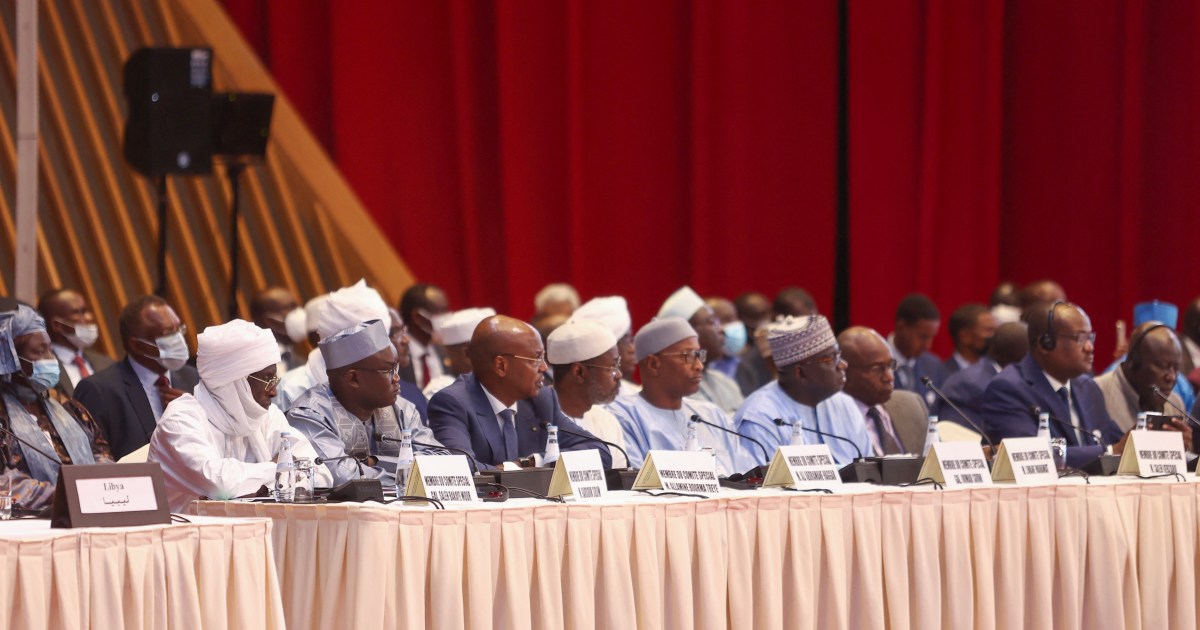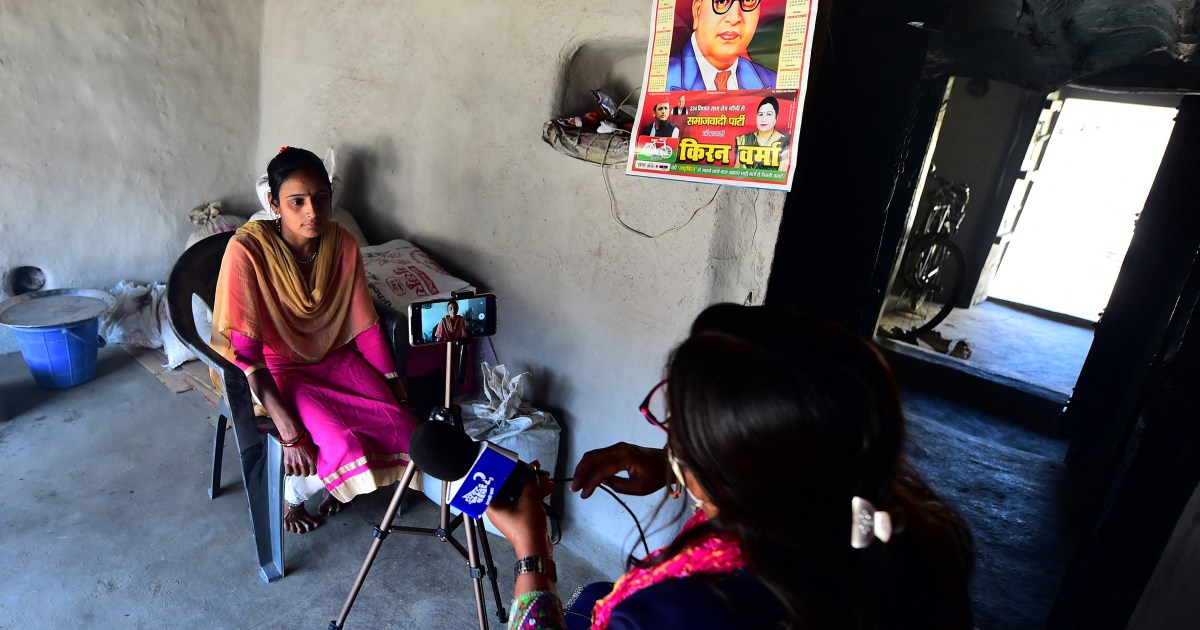What is happening with Chad’s peace talks in Doha? | Politics News
Doha, Qatar – In the second week of March, some 300 Chadian rebels checked into a five-star hotel in downtown Doha. They had flown to the Qatari capital to sign a deal with representatives of Chad’s transitional government and pave the way for their country’s transition towards democracy.
What they didn’t foresee is that the process would take weeks.
In fact, it is still ongoing as negotiations move at a snail’s pace amid a series of walkouts, stoppages and corridor chats worthy of a saga.
With delegates of Chad’s ruling military transitional council also placed at the 43-story hotel by their Qatari hosts, the JW Marriott Marquis has become the epicentre of a somewhat bizarre cohabitation where people who have been fiercely fighting each other for decades – politically or military – find themselves sharing elevator rides or passing forks while queuing at the hotel’s breakfast buffet on the first floor.
“We are crabs in a bucket,” said one of the rebels, jokingly.
But how did we get here?
Since Chad gained independence in 1960, the transfer of power in the country has often come through force. The latest president, Idriss Deby, seized power by spearheading a rebellion in 1990, and himself faced the threat of being overthrown by rebel-led incursions – in 2006, 2008 and again in 2019.
But in April 2021, he was killed on the battlefield while leading troops against the Front for Change and Concord in Chad (FACT) – the strongest and one of the few still active groups among those 52 now attending talks in Doha.
In typical fashion, the army swiftly suspended the constitution, dissolved parliament and the government and placed Deby’s son, Mahamat Idriss Deby, also known as Kaka, at the helm of a Transitional Military Council (TMC).
The new leader proposed a national dialogue with rebels and members of the civil society to agree on a constitutional framework to hold elections within 18 months.
The rebels agreed to join such a dialogue, planned for May 10 but likely to be delayed, under certain conditions to be discussed beforehand – hence the “pre-dialogue” in Doha. The conditions include a security guarantee for all those who want to return, restricting current members of the TMC from running for elections, and a revision of the constitution.
So how are things going?
Things began awkwardly. Talks were suspended after FACT representatives walked out on more than 50 groups’ delegations at the inauguration of the pre-dialogue on March 13.
Critics say by inviting such a large number of rebel groups, the transitional government came with the intention not to seal a deal but rather to dilute the negotiations by involving splinter factions and former rebel leaders who have already joined the interim government.
They also expected the Qatari host to play a more decisive role as a mediator, rather than just a facilitator of the talks.
Instead, the rebels have stepped up to the plate, re-organising into three main groups called Qatar, Doha and Roma – the latter inclusive of the most important and militarily relevant rebel groups – to convoy a more cohesive voice.
“They [the members of the TMC’s delegation] came here not being serious, but they found themselves forced into a very serious negotiation,” a rebel leader said.
Qatar has since clarified its position as a mediator, meaning that the country will guarantee the monitoring and implementation of the final agreement. This is the first peace process in a long time to come under international mediation, with previous rounds of talks not involving international players, government representatives and rebels, with whom Deby senior refused to negotiate.
Now, each of the three groups has put forward its own list of preconditions. These are being synergised by the Qatari mediator into a single wish list that will be presented to the Chadian government.
That’s when the talks will officially restart.
A risky cohabitation
But as one rebel said, “The pre-dialogue is already in full swing … it’s happening everywhere, at the cafe, at the corridors, in the rooms of this hotel.”
Some rebels, having spent decades in exile, describe a sense of distrust and unease being in the same spot as representatives of the power in N’Djamena. Others talked about the uniqueness of the “historical moment”, noting that many among them were cousins who had never seen each other.
“It’s like a big family that hasn’t agreed yet on how to build its own house,” another rebel leader said, adding that by placing all of them in the same hotel, the host proved a “brilliant strategy” to smooth tensions among rival factions.
But the cohabitation can be risky, especially if, as some fear, the government’s representatives try to break ranks among the rebels.
“They have continued Idriss Deby’s strategy of splintering groups and co-opting individual splinters, even in the midst of the talks,” said Jerome Tubiana, an independent researcher on Chad.
According to Tubiana, the government does not seem to have a unified vision after having “entrusted the file not to one but to many government representatives who often seemed in competition”, he said.
Two key members of the TMC’s delegation – namely reconciliation minister Acheick Ibn Oumar and ex-president and former strongman Goukouni Weddeye – seem committed to peace, Tubiana explained. But they have been either sidelined or not been able to play any leading role up to now, he said.
What is the goal?
The goal of the Doha talks is mostly “to give credibility to the transitional government’s safety guarantees that the main groups – those with a history of violence or just opposition parties – will be able to come back to N’Djamena and be reintegrated into the Chadian political game without risk [to] life or detention” said Benjamin Augé, a researcher at the French Institute of International Relations, who has been closely monitoring the negotiations.
Other sensitive demands, such as the non-eligibility of TMC members in the next elections, are unlikely going to be agreed in Doha as the government would likely push those discussions to the national dialogue, Augé added.
Even if a safe return of the rebels – a landmark moment for Chad – is agreed on, there are no guarantees of a more inclusive country given that power has only been rotated among a privileged minority.
“These talks are mostly a family matter as the main groups invited to Doha are coming from the same tribes who have been ruling Chad since 1990,” said Augé.
Meanwhile, as it often happens within families, disagreements can break out. In those cases, Les Sages (the “wise ones”), a group of men also known as “the human resources”, who sit every day on the same long sofa, step in to advise.
One such case happened on Friday after the Military Command Council for the Salvation of the Republic (CCMSR), one of the most relevant rebel groups, was expelled from the Roma movement due to internal disagreements. The CCMSR’s spokesperson said the group continues to participate in the pre-dialogue, but is unsure of its path within the reconciliation at this stage.
While it remains unclear what the impact of the latest development will be, the hotel bookings will likely be extended a little longer.





Pingback: look at this now